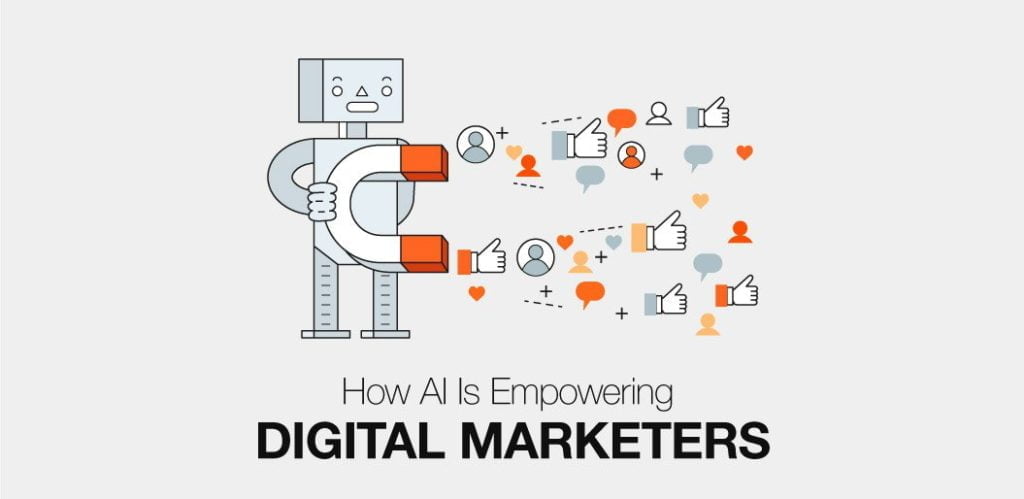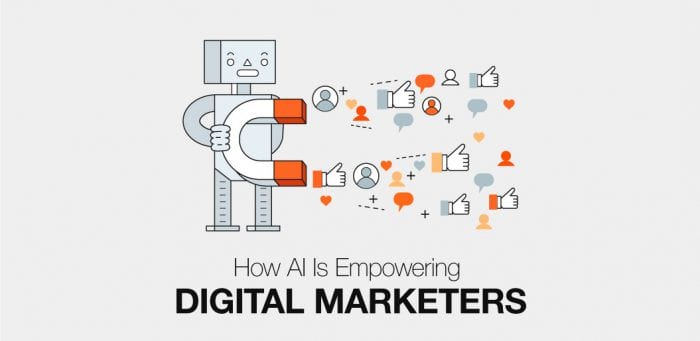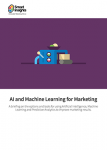8 ways by which AI will affect comprehension of data, analyze and utilize data as well as shaping the development of digital marketing tools
Earlier this year, Toyota’s usage of AI for its Rav4 Marketing Campaign got the jaws dropping and the eyes widening. IBM’s Watson had struck again – a Machine Learning (ML) program that used an algorithm to generate ad scripts! The campaign is an example of how Toyota agency-of-record Saatchi & Saatchi Los Angeles is using what it calls “creative programmatic.”
The agency wanted to connect the Toyota’s Rav4 crossover to the favorite activities of individual consumers but in an unpredictable way. So, Saatchi fed Watson the world’s top 1,000 activities – like biking, dancing, and cooking – and asked Watson to pair two activities that had low probabilities of being matched. The agency then used the pairings to create 300 unique videos, which targeted at users on Facebook and Instagram.
This is an example of how AI has already made inroads in the sphere of digital marketing, where global brands are competing with each other. AI, once a science fiction fantasy, then a laugh-inducing project, is now increasingly becoming a cornerstone of emerging technologies across various industries. Unsurprisingly, the tech-savvy world of digital marketing is already beginning to put AI to great use to automate and improve current marketing processes.
There are copious amounts of data available everywhere, which is, in fact, making the processes more cumbersome, if done manually. This makes human behavior to abandon data and go by intuition. This is the kind of scenario where AI emerges as a powered tool as intuition won’t lead one to astute results.
A digital marketer constantly goes through these questions – Who should I reach out to? What should I send? When should I schedule my posts? Over what channel will my posts have greater reach? Comprehensive answers to these questions are looked with an aim to create engagement amongst customers and further lead to growth, fostering sales and finally build a brand!
1. Impactful Advertisements
Facebook has a service that uses AI to present you ads on the basis of your likes and dislikes; Netflix presents you viewing recommendations on the basis of your tastes in past history and even the major e-commerce portals use AI as a tool to feed your page on the basis of your lifestyle and previous buys. With programmatic accounting for 67% of all global display ads in 2017, AI is needed more than ever to ensure the increased volume of ads does not affect the quality of ads. Marketers can maintain positive brand perception and engage with newer audiences with AI’s help. However, brands should know that it is not about taking advantage of AI, but it is about learning to work with a system that thinks like a human.
Though one can still view certain ads, which might be redundant, it is good to know that this problem won’t continue for long.
Individual advertising is an ongoing project and is worth the effort. Traditional audience segmentation is dying. People want and need to receive personalized treatment, and AI + ML works on the basis of customer preference and will continue to generate and serve people’s needs in the future with the help of artificial intelligence.
2. Smarter Search
AI is centrally focused on taking algorithm of search engine to a next level i.e., helping the customer reach the destination in a shorter period with need-to-know- information.
For example, when you Google specific words – a mix of information including location, search history, time of day, and context is analyzed to present you with a list of results. Brands can’t take advantage of this AI but instead can create content that Google considers valuable. This is because of Google’s AI. Rank Brain isn’t an algorithm you can just throw keywords at. It’s learning to read on-site content and queries just like a human. The results Google presents are the best answers to a user’s question. Voice queries from personal AIs such as Google Home, Amazon Echo, and the just-announced Apple HomePad are also being analyzed through Google.
3. Evolution of ChatBots
Chatbots effortlessly engage with your audience through an inbuilt messaging platform. Services like Uber use Facebook’s AI chatbot to help users request rides and receive driver updates without leaving Facebook Messenger. Chatbots help by uniquely promoting your brand or providing relevant data on your audience. This data can help brands market certain products, discover what needs fixing, and how to better target your desired audience.
4. Reaching the right person
In traditional marketing, it was a cumbersome task to collect data of various sample sizes, filter it, and further analyze it to try and make sense of it. AI helps to penetrate deep in the data, which is easily extractable from various sources and further help digital marketers in reaching the right audience through segmentation and based on various preferences – age, lifestyle, choices, income, profession, etc.
Consumers can browse through various AI empowered suggestions websites from the luxury of sitting in their homes!
5. Build a strategy for target market
Facebook has already started using AI in other ways like lookalike audience. With this feature, you can find new customers, which resemble your present audience. Lookalike audience takes your current audience, adds on top of it the additional data you provide, and then further uses that intelligence to target lookalike audiences, i.e. new audience with shared interests. This tool opens your doors to consumers who are unaware of your brand and helps build a future strategy for your target market.
6. Improves cybersecurity
Due to an exponential increase in online activity, even huge corporations are protective of their brand image as any virus can damage their reputation. AI tracks any abnormal activity in the algorithm, that is different from a regular pattern and alerts the digital marketers of a threat.
7. Smarter Sentiment
Due to the rise of social platforms with consumers posting about their expectations from brands and their preferences, it becomes humanly impossible to sort through all the things being posted. Marketing is all about inclusion – stepping in your consumer’s shoes. When the number of shoes is increasing daily, digital marketers are shifting to AI to help them sort this escalating issue
As an example, Facebook is using deep learning technology to better detect human faces, and with their DeepText program, Facebook is cracking the code of computers understanding the nuances of language. For marketers, this means more segmentation that is accurate and targeting for ads.
8. Sales Forecasting
Sales and Marketing were traditionally considered as separate departments in organizations. However, modern practices have broken that barrier and are constantly working towards bridging that barrier between these two. AI can do this very easily and as it has access to huge amount of data. AI can help analyze inbound communications and interpret them to make actions based on the past behaviors. AI can help filter the vast amounts of data to focus the probability of a conversion, which a human can take very long time to do.
Whether we like it for the ease AI brings into our lives, as digital marketers and as consumers both, or we hate it for the fact that it turns creepy as a person feels exposed, AI is here to stay. Its penetration in our lives may even continually grow, and maybe we might be soon living in an age where chatbots remind us of our spouse’s birthday while we are busy browsing through an ecommerce website. Regardless, AI is continually becoming an empowering tool for digital marketers and works on the tricks to get the information from an individual or the group of people to and make your brand a huge one. It is safe to say that AI is a secured investment, which is sure to get dividends!


